L'idée de voyager avec SIBO vous terrifie-t-elle ? Craignez-vous de ne plus jamais pouvoir quitter votre domicile ?
La bonne nouvelle est qu'avoir SIBO ne signifie pas que vous devez être un ermite. Je suis un grand voyageur, ayant visité de nombreux pays depuis mon diagnostic SIBO. Et je suis ici pour vous dire qu'il est possible de voyager avec SIBO.
Au cours du dernier mois, j'ai voyagé deux fois vers et depuis les États-Unis. Cela représente 4 vols long-courriers plus des vols intérieurs plus courts. J'ai rassemblé pour vous les miens et les meilleurs conseils de la communauté Healthy Gut sur la façon de voyager à l'étranger avec SIBO.
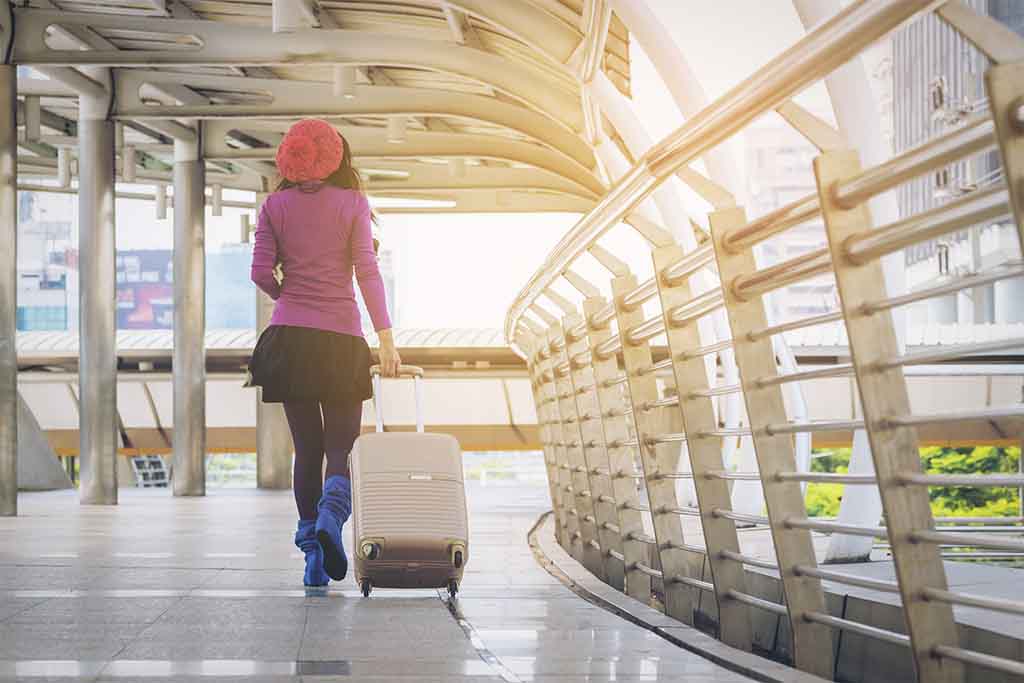
Si vous allez investir dans un voyage international, ne lésinez pas sur le vol. L'expérience que vous avez avec une compagnie aérienne peut rendre le début et la fin de votre voyage fantastiques ou horribles. Vous voulez profiter de votre vol, et la compagnie aérienne que vous choisissez peut jouer un grand rôle pour rendre cela possible.
Réfléchissez à ce qui est important pour vous :

La vitesse à laquelle vous pouvez atteindre votre destination



































Le nombre de correspondances que vous devrez effectuer ou un vol direct sans escale



































Commodités en vol



































Options de repas



































Espacement et largeur du siège



































Options de mise à niveau
Lorsque je voyage plus de quelques heures, je mets toujours mon confort au premier plan. Je choisis des compagnies aériennes qui permettent des surclassements vers une cabine plus premium et offrent un bon service en vol. Je voyage avec Virgin Australia vers et depuis les États-Unis, car vous pouvez soumettre une offre pour les cabines Premium Economy et Business. J'achète un siège Economy, puis j'offre le montant le plus bas possible pour un surclassement. Si je ne l'obtiens pas, je n'ai rien payé, c'est donc une excellente option. Je n'ai raté un surclassement qu'une seule fois et j'ai eu la chance d'être surclassé en classe Affaires lors de plusieurs voyages.
J'ai également voyagé avec Air New Zealand aux États-Unis lors de plusieurs voyages, et leurs cabines Premium Economy et Business sont fantastiques, et leur service est exceptionnel, bien qu'ils n'offrent pas l'option d'enchère comme le fait Virgin Australia, mais ont souvent de bonnes ventes afin que vous puissiez choisir un tarif pour un bon prix.
Bien sûr, si vous pouvez vous permettre d'acheter un siège premium, faites-le ! Cela rend le vol tellement plus agréable.
J'ai déjà volé sur des compagnies aériennes moins chères à l'international, mais je suis arrivé épuisé après avoir été entassé comme une sardine pendant des heures, et j'ai même été agressé sexuellement sur un vol avec Royal Brunei Airlines (de Londres à Melbourne), où le personnel et la compagnie aérienne n'ont rien fait à ce sujet . J'avais acheté ce vol parce qu'il était tellement bon marché; cela semblait trop beau pour être vrai. C'était le cas et je n'opterai plus jamais pour la compagnie aérienne la moins chère.
"Voyage est une expérience merveilleuse. Ne laissez pas SIBO vous empêcher de faire les choses que vous aimez."
Rebecca Coomes
Je voyage toujours avec des compagnies aériennes sur des vols long-courriers qui me permettent de sélectionner mon siège à l'avance. Lorsque vous avez SIBO, vous avez assez d'anxiété pour aller aux toilettes. Vous n'avez pas besoin de vous inquiéter davantage de ne pas avoir un siège confortable.
Sur les vols long-courriers, je toujours choisir un siège côté couloir, afin que je puisse me lever facilement aux toilettes et ne pas avoir à grimper sur des étrangers ou à déranger qui que ce soit par mes visites constantes aux toilettes.
Si vous prenez un vol de nuit, vous préférerez peut-être un siège près du hublot pour pouvoir vous reposer contre l'avion pendant votre sommeil. Personnellement, je deviens trop anxieux à l'idée de ne pas pouvoir aller aux toilettes, donc je préférerai toujours un siège côté couloir à un siège côté fenêtre.
Vous voulez voir quelles sont les meilleures places sur votre vol ? Découvrez Seat Guru où vous pouvez entrer votre compagnie aérienne et votre numéro de vol, et ils vous montreront quels sont les meilleurs et les pires sièges dans l'avion.
Tout comme le choix de votre siège est important pour réduire votre anxiété liée aux toilettes pendant le vol, il est également important de choisir de voyager avec une compagnie aérienne qui propose une large gamme de repas en vol.
Faites défiler vers le bas pour voir ce que je pense de manger dans un avion, mais je pense qu'il est important d'avoir un repas à votre disposition, même si vous ne finissez pas par le manger.
Lorsque vous voyagez en classe économique, vous recevrez un standard repas (pas de menus flashy ici) et recevra généralement 2-3 options. Cependant, vous pouvez soumettre une demande de repas spécial à l'avance. La plupart des compagnies aériennes exigent un préavis de 48 heures, mais renseignez-vous auprès de votre compagnie aérienne afin de ne pas rater un repas convenable.
Choisissez le type de nourriture qui vous dérange le plus. Pour moi c'est du gluten. Bien qu'il n'y ait pas actuellement d'option de repas à faible teneur en FODMAP disponible sur les compagnies aériennes, vous pouvez choisir parmi une gamme de repas, notamment :



































Sans gluten



































Lactose free



































Bland meal (no onion, garlic, spices, strong seasonings)



































Vegetarian and vegan
Sadly, you can't combine 2 or 3 meal types. For instance, you can't request a meal that's gluten and lactose-free and bland, which is what most SIBOers will need.
When flying in Premium Economy, Business or First, you will be presented with a lot more meal options. I have found that I can pick regular meals off the menu, rather than having to pre-order a special meal, because there's always a gluten free option.
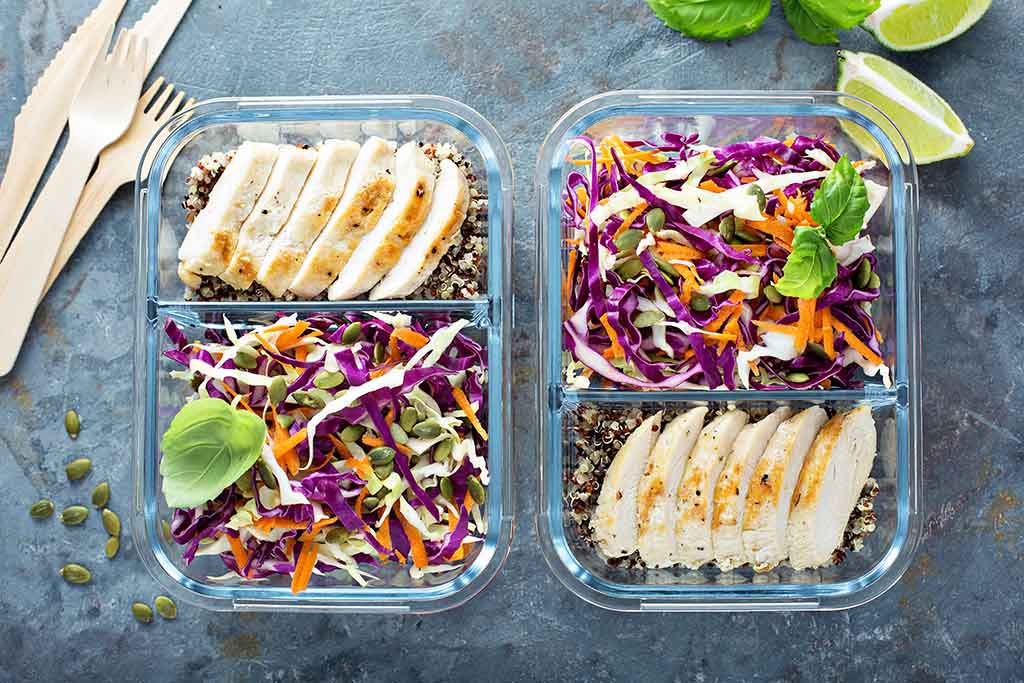

There are fluid restrictions on long-haul flights (maximum of 100ml per container) but there aren't currently food restrictions. However, it's always advisable to contact your airline to double check if you have any doubts.
If you want to eat on your flight, you might prefer to bring your own food and snacks for the flight. You can purchase an insulated bag with ice pack inserts (like this one ). Some great meal and snack options include:



































Grilled chicken pieces



































Slices of cooked beef or lamb



































Tins of tuna or sardines (your neighbours might not love you for this though)



































Salad or cooked vegetables



































100ml container of salad dressing



































Veggie sticks with a small container of chunky roasted pumpkin and macadamia dip



































Pieces of fruit



































Nuts and seeds



































Nut butters in individual portions



































Jerky



































Individual portions of cheese (if tolerated)



































SIBO friendly crackers



































Potato or vegetable chips cooked in suitable oil and seasoned with salt



































A container of my Prosciutto, Egg and Capsicum Muffins or Blueberry Muffins



































Chocolate bark , flavoured chocolates or choc chip granola bars for a sweet treat



































The Elemental Diet - I use the Integrative Therapeutics Physicians Formula (bring the powder and a shaker. You can ask for ice and water to make it into a drink)
You won't be able to take your food into your arrival destination so don't go crazy - just bring as much as you think you can eat so you don't have to throw a lot of food out at the end of the flight.
In case the security screening confiscates your ice packs, always pack a leak-proof zip lock bag says Monica Hardy from our SIBO Bi Phasic Diet Facebook Group . She asks the flight attendants to fill it with ice once she gets on the plane so she can still keep her food cool.
You don't have to eat on a long-haul flight. Instead, you may choose to use the time to fast and just sip water or herbal teas.
Personally, I find having an empty stomach easier on my body than having it full of food. I always bloat on flights, no matter what I do, so the more I avoid food, the easier it is on my system.
I do find that I get very hungry on long-haul flights, so even if you decide to fast, I would recommend you have a back up in case you change your mind. When everyone else is brought their food and the cabin is full of food smells, it can be very difficult to maintain your resolve to keep fasting.
Because I always bloat on long-haul flights, I always wear loose fitting clothes with stretchy waistbands that will allow my belly to grow over the course of the flight. There is nothing worse than being stuck in tight-fitting clothes, in pain from the bloating, and not able to do anything about it.
I also like to layer my clothes. This helps hide the bloating. I take a long scarf, a long cardigan and a jacket. That way I can layer up if I get cold or strip down to a lighter top if the plane is hot. Most of the trips I've done recently are freezing cold, so I'm always glad I've got multiple layers.
I also spray my scarf with perfume or essential oils so that if there are smells on the plane that I don't like, I can bury my nose in my scarf and avoid them.
Finally, pack a spare pair of underwear and clothes. I always plan for the unexpected. If you have an upset tummy and have an accident, you can feel better knowing you can change your clothes. Or, if your luggage goes missing, you at least have one outfit and new underwear to wear.
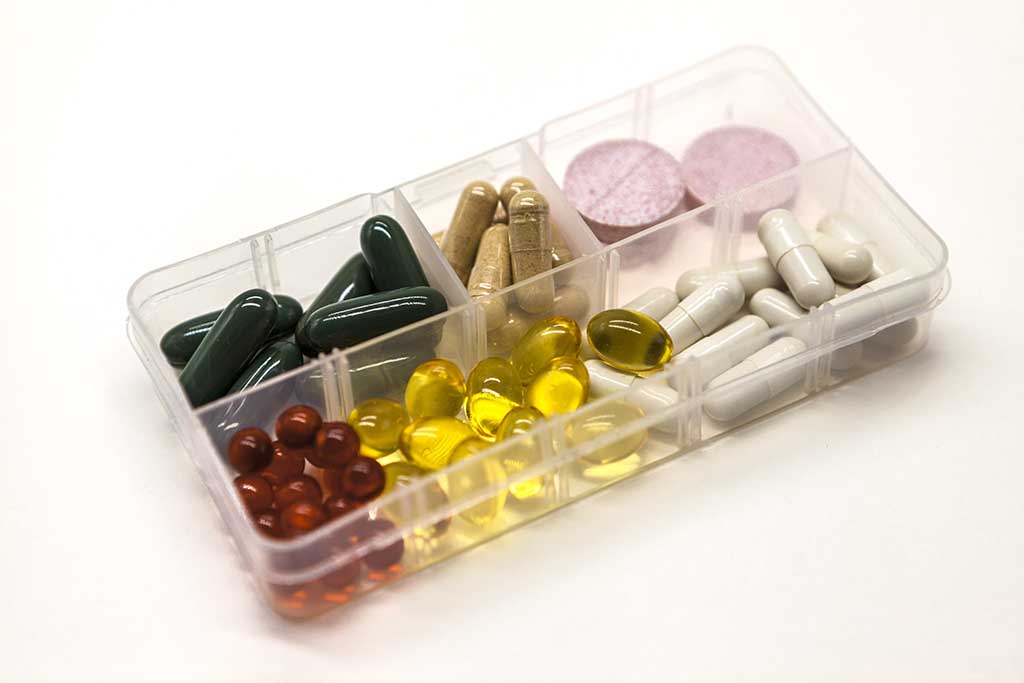

Talk to your Practitioner about your forthcoming trip. They will review your medication and may even suggest some additional supplements to support you. Before I flew to Thailand, I saw my Naturopath and we added in some extra herbs to help prevent potential food poisoning.
Choose where you will carry your medication. I put it in my hand luggage. That way, if my main bag is delayed, I still have my medication with me. Get a small cooler bag for any medication that needs to be kept refrigerated.
Ensure you have enough for the duration of your trip. You don't want to run out in a foreign country, where you might find it hard to get replacements.
During the flight, you may want to take some supplements to help with any symptom you experience. Dr Allison Siebecker has a handout with a range of supplements for each type of symptom . Some common supplements to pack include:



































Activated charcoal



































Iberogast



































Gas X



































Peppermint oil



































Magnesium



































IBGuard



































Electrolyte replacement or oral rehydration



































Imodium
Changing time zones? Get ready for your new time by getting to bed earlier or staying up later in the days leading up to the flight and before you head home. Timeshifter is a handy app that helps you prepare for your new timezone by giving you tips on when to avoid or get things like sunlight, caffeine, sleep and melatonin.
Most international flights come with in-flight entertainment. However, I have been on a handful of flights where the entertainment system has broken. For this reason, I always have a backup plan. I download Netflix movies and tv shows onto my iPad, which I can watch when I'm offline. I have a couple of books available in my Kindle app on my iPhone and have enough podcasts and audiobooks downloaded that I can listen to them for the full duration of the flight if I need to.
If you're an anxious flyer, why not download a meditation app to your phone, so you can do some meditation while you're flying?
Aeroplanes are notoriously germ-ridden places. Everything from faecal matter to Methicillin-resistant Staphylococcus aureus (MRSA) bacteria has been found hiding in the passenger cabin of planes.
Pack anti-bacterial wipes in your carry-on bag and use them to clean your armrest, tray, seat belt clip, toilet door handle and flush.
I also use the Biocidin Throat Spray during the flight. It helps ward off any germs that are spread if people are coughing and spluttering on the plane.
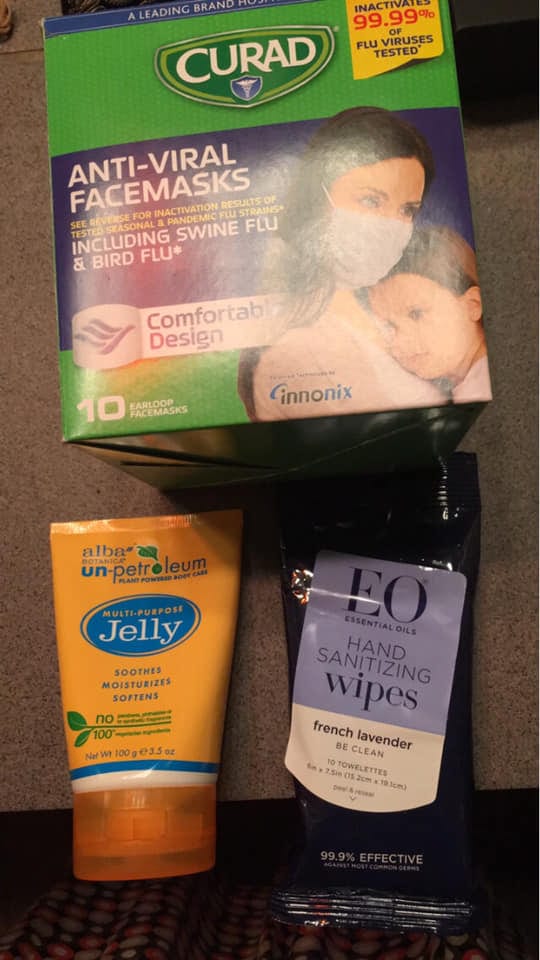

My SIBO Coaching client , Sharon Treadgold packed these items for her recent trip to Australia from the US. The face masks gave her an added sense of security that she wasn't breathing in other peoples' germs.
Whether you plan to be awake or asleep on the flight, bringing a few home comforts with you can help you feel more relaxed. I travel with noise cancelling headphones, my own blanket, a revitalising moisturiser from Ecology Skincare , a neck pillow, eye mask and ear plugs. I also wear flight socks and have a pair of flip flops handy so I can walk into the toilet with shoes on.
Studies have shown that the blankets you receive on the plane are not overly hygienic, as they aren’t regularly cleaned, despite coming in new plastic wrapping. You can only imagine the things people use them for:wiping dirty hands, blowing noses, changing nappies on, or other equally unpleasant activities. It’s not something we want to snuggle up with.
Aeroplane travel is extremely dehydrating. The longer you spend on a plane, the more dehydrated you will become. It is important you are constantly sipping water to keep your body hydrated. Avoid alcohol as this increased the dehydration and can also cause digestive distress.
I take an empty water container through security and then fill it up before I board the flight. I then ask the staff to fill it up with water during the flight.
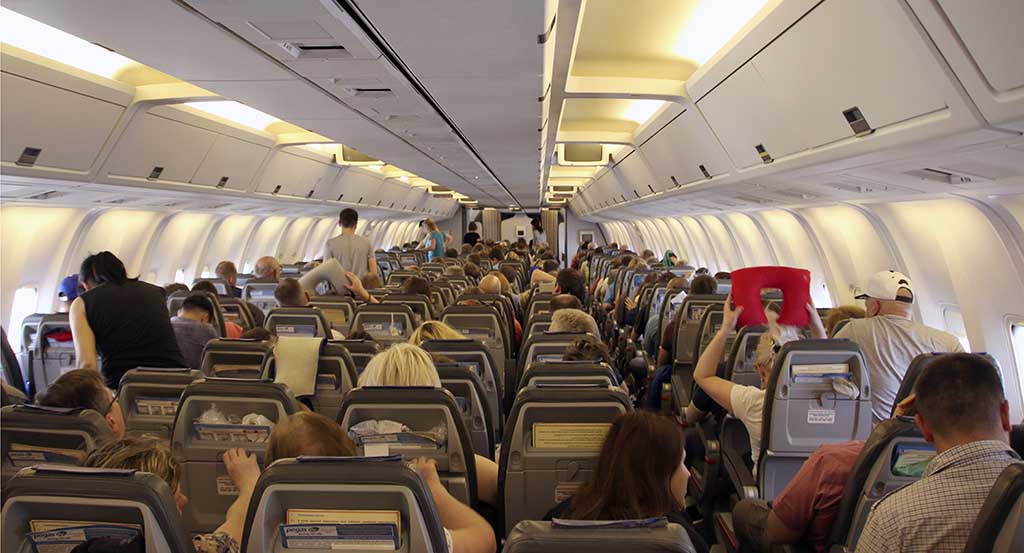

When you are sitting down for many hours at a time, your digestion can slow down and get sluggish. Whenever possible, get up and move your body on the flight. I like to walk up and down the aisles or I will go and stand down the back of the plane and do some simple stretches. If you have a layover, use it as an opportunity to stretch your legs. I walk up and down the terminal, moving constantly until I need to get back on the plane.
On my most recent flight to the US, I departed Melbourne at 11.30am. As soon as I got on the plane, I changed my watch to US Pacific Time and started telling myself that it was 6.30pm. As soon as we had been fed dinner, I told myself it was bedtime and took a melatonin tablet and went to sleep. When I arrived at LAX at 9am, I was relatively refreshed and ready for the day ahead.
The first thing I do when I arrive at my new destination is to go outdoors and get some fresh air and sunlight on my skin. This helps acclimate to my new timezone and environment. Even if I have arrived at a winter destination, I wrap up nice and warm and head out.
If the weather is warm, I like to touch the ground with bare feet. Dave Asprey of Bulletproof fame talks about how earthing helps return the body to a neutral current. I personally find it beneficial and make an effort to touch the ground with bare feet whenever I can.


After many hours crammed into a plane, there is nothing better than moving your body. It helps to get fresh oxygen to all parts of your body, and can also help reset your circadian rhythm to your new timezone. I always pack a sturdy pair of walking shoes and hit the pavement of my new location. It's a great way to check out your new neighbourhood while also exercising. Check out a local yoga or pilates class for some structured exercise or do a walking tour.
You might be off the plane, but it doesn't mean your body isn't still recovering from the impact of long-haul travel. Keeping your food simple will help ease the pressure on your gut. I love nothing more than some steamed or grilled fish and steamed veggies when I first arrive. Also keep your meal sizes small to give your gut a chance to process the food. As tempting as it might be, avoid alcohol as this will contribute to your dehydration and can interrupt your sleep cycle.
I always incorporate intermittent fasting into my travel routine. It helps my gut calm down from the pressure of travelling, and I find I sleep better when I haven't eaten a lot.
You might like to ensure you get at least 12 hours break between dinner and breakfast, or if you're like me, you can skip breakfast entirely and just eat lunch and dinner.


Spend the first few days of your new location focusing on hydration. Your body has been put under enormous pressure on the plane, so be kind to it and drink lots of good quality, filtered water.
Doing all of the above will help re-set your circadian rhythm. If you arrive in the morning, stay awake as long as you can, ideally going to bed at your normal bedtime.
If you must take a nap, keep it short so you don't confuse your body and further disrupt your sleep cycle.
If you are still struggling to sleep, you might like to take a sleeping aid. I use Integrative Therapeutics Cortisol Manager to help re-set my cortisol levels. If this isn't enough support, I will also take some melatonin at bedtime. This will normally put me to sleep within 30 minutes of taking it.
If you wake during the night, try to avoid turning on any electrical devices. The blue light emitted from these devices can disrupt your sleep-wake cycle. Instead, try some meditation, deep breathing or relaxation techniques. If that fails, I will lay in bed and read a book until I get sleepy again.
It is estimated that for every 1 hour of timezone change, it can take 1 day to recover. Be kind to yourself during this recalibration to your new time zone. If sleep isn't coming easily, stressing about it will make it worse. You will get into your new timezone eventually.


It is a privilege to travel and see new parts of the world. Yes, SIBO can be frustrating, but you have control over how you think . If you choose to approach travel with fear, it's highly likely your trip will be extremely stressful. Instead, if you approach your trip with interest and intrigue and allow for situations to happen that are outside of your control, you will enjoy your trip much more.
I love the uncertainty of travel. I love meeting new people, tasting new food, learning new languages, smelling new smells, seeing new cities and landscapes, and even when things go wrong, I find a way to laugh about it.
Before you go, brainstorm a wide range of possible scenarios and think about how you will handle those situations. The more prepared you are, the easier they will be to cope with.
Do you have your own fool-proof travel hacks? I would love to hear them. Simply put them in the comments below.
Pin945 Shares Style de vie SCD sur les ondes radio
Style de vie SCD sur les ondes radio
 Les faits sur les maladies inflammatoires de l'intestin et le microbiome intestinal
Les faits sur les maladies inflammatoires de l'intestin et le microbiome intestinal
 Le mythe des calories :le livre que vous lirez et transmettrez à votre famille en 2014
Le mythe des calories :le livre que vous lirez et transmettrez à votre famille en 2014
 Tests utilisés pour le diagnostic du RGO
Tests utilisés pour le diagnostic du RGO
 Le déclencheur de diarrhée le plus courant (que vous ignorez)
Le déclencheur de diarrhée le plus courant (que vous ignorez)
 Les oxyures (Enterobiasis) chez les enfants et les adultes
Les oxyures (Enterobiasis) chez les enfants et les adultes
 Peut-on guérir la colite ulcéreuse ?
Quest-ce que la colite ulcéreuse ? La colite ulcéreuse est un type de maladie intestinale inflammatoire. Bien quil nexiste aucun remède connu contre la colite ulcéreuse, un traitement peut vous aid
Peut-on guérir la colite ulcéreuse ?
Quest-ce que la colite ulcéreuse ? La colite ulcéreuse est un type de maladie intestinale inflammatoire. Bien quil nexiste aucun remède connu contre la colite ulcéreuse, un traitement peut vous aid
 Pourquoi les symptômes du SII peuvent s'aggraver pendant vos règles
Si vous avez des menstruations, vous avez peut-être remarqué que vos symptômes du SCI changent en fonction de la période du mois. Vous nimaginez rien :votre cycle menstruel et la gravité de vos symptô
Pourquoi les symptômes du SII peuvent s'aggraver pendant vos règles
Si vous avez des menstruations, vous avez peut-être remarqué que vos symptômes du SCI changent en fonction de la période du mois. Vous nimaginez rien :votre cycle menstruel et la gravité de vos symptô
 Les premiers signes de calculs rénaux (néphrolithiase)
Illustration des reins et des calculs rénaux. Faits sur les calculs rénaux Un calcul rénal est un matériau minéral dur et cristallin formé dans le rein ou les voies urinaires. Néphrolithiase est le t
Les premiers signes de calculs rénaux (néphrolithiase)
Illustration des reins et des calculs rénaux. Faits sur les calculs rénaux Un calcul rénal est un matériau minéral dur et cristallin formé dans le rein ou les voies urinaires. Néphrolithiase est le t